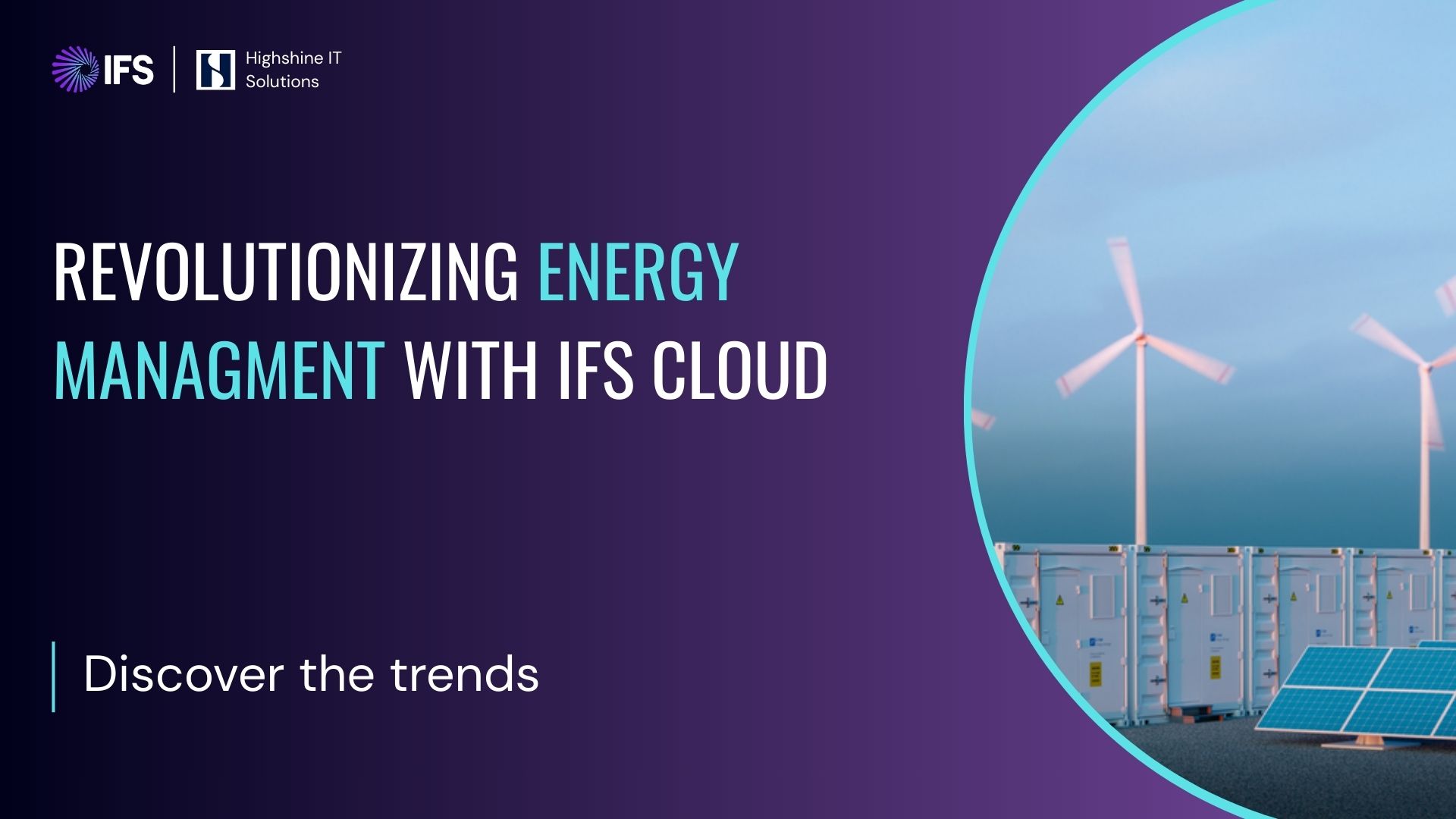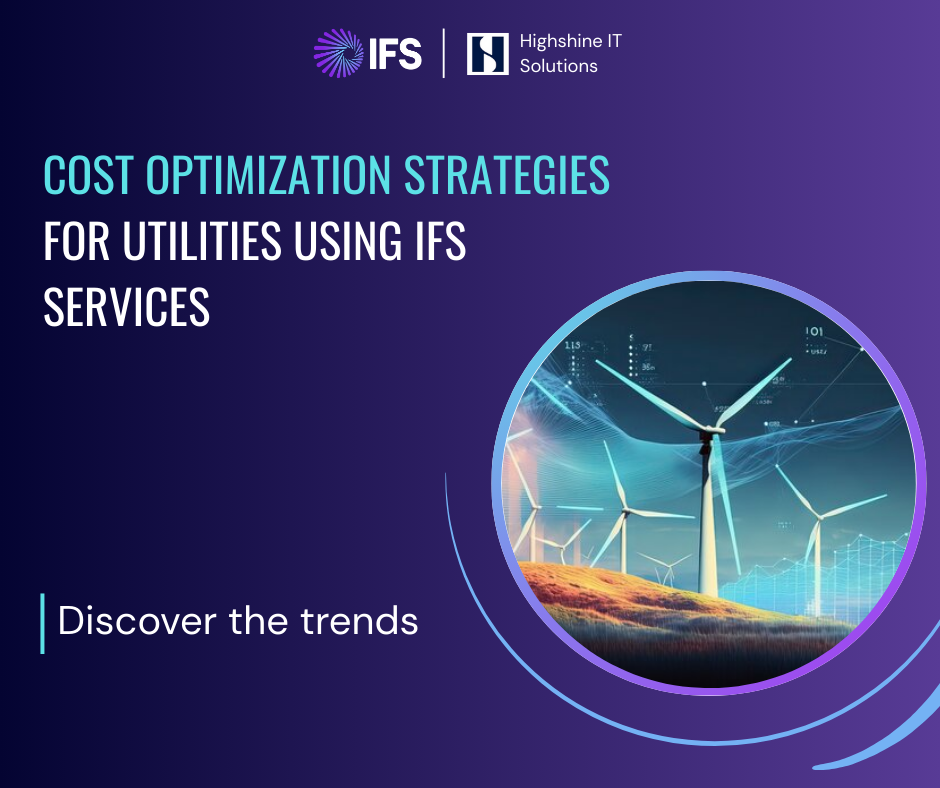
Revolutionizing Energy Management with IFS Cloud
Introduction to IFS Cloud in the Energy Sector
Have you ever wondered how the energy industry is tackling its myriad challenges today? With the need for innovative energy management solutions higher than ever, the industry faces constant pressures. From regulatory demands to the imperative of digital transformation, the stakes are high. Enter IFS Cloud for the Energy Industry, a game changer in this landscape.
But why is IFS Cloud so pivotal?
It is uniquely positioned to integrate asset management, project management, and field services into a seamless platform. This integration not only addresses today's challenges but also prepares energy companies for future shifts. Let's explore how IFS Cloud is revolutionising the industry.
Transformative Features of IFS Cloud
What makes IFS Cloud stand out in the energy sector? Let's break it down:
1. Integrated Asset Lifecycle Management: Tracks and analyses asset performance, enabling predictive maintenance and real-time visibility.
2. Embedded Industrial AI: Harnesses IoT data from various infrastructures like wind turbines and oil rigs to boost efficiency and lower costs.
3. Composable Architecture: Provides rapid deployment and adaptability for diverse applications, from renewables to traditional operations.
4. Project & Resource Planning: Efficiently manages complex projects, optimising both capital and operational expenditures.
5. Cloud-Native Platform: Ensures scalability and compliance, facilitating global operations.
These features collectively enhance process visibility and efficiency, which are crucial in the dynamic energy landscape. Did you know that IFS Cloud for the Manufacturing Industry also benefits from these features, proving its versatility?
Impact on Operational Efficiency
How does IFS Cloud enhance operational processes? By consolidating systems into a unified, cloud-based solution, it significantly boosts efficiency. Here's how:
1. Unified Data Management and Analytics: Provides real-time access to data, improving decision-making and forecasting. With IFS Cloud, you can leverage integrated dashboards to track energy use across all sites in real time, enabling operators to pinpoint inefficiencies—e.g., a solar farm reduced peak-demand charges by 12% within the first quarter through automated alerts.
2. Predictive Maintenance: Utilises IoT sensors for condition-based monitoring, reducing outages and extending asset life. In simpler terms, IFS Cloud can link up with utility price signals to automatically adjust production or plan less important maintenance during times when energy is cheaper—like when an industrial plant saved 8% on energy costs by moving heavy tasks to times with lower rates.
3. Automated Workflows: Streamlines processes from dispatch to reporting, reducing downtime and administrative burdens. IFS Cloud can collect emissions information from connected equipment and bring it together in one place for easy sustainability reports and to meet environmental rules—e.g., an oil-and-gas company sped up its quarterly environmental reporting by 20% through automatic data gathering.
These improvements lead to tangible cost reductions, decreased downtime, and minimal resource waste. Isn't it remarkable how a single platform can drive such a transformation?
Case Studies: Success Stories in Energy Management
Real-world applications of IFS Cloud in energy management offer compelling evidence of its impact.
In the oil and gas sector, a major energy operator adopted IFS Cloud, leading to a significant reduction in unplanned turbine outages and lower maintenance expenses. Regulatory compliance was also enhanced, alongside improved ESG insights.
In the renewable energy field, a top company used IFS Cloud to handle its renewable energy projects, allowing for better management of assets and operations that can grow, which will help produce more clean energy by 2035.
Meanwhile, a prominent utility company used IFS Cloud to streamline field service and asset management, incorporating real-time data insights for future-ready grid management, ultimately enhancing sustainability across hydro and green energy operations. These stories underscore the strategic importance and versatility of IFS Cloud in transforming energy management.
Integrating IFS Cloud with Existing Systems
IFS Cloud integrates with legacy systems seamlessly, and its integration capabilities are a major advantage.
1. Seamless Data Migration: Minimises disruption and ensures high ROI post-implementation.
2. Interoperability: Connects with SCADA, GIS, ERP, and asset management platforms, consolidating data for centralized control and analytics.
3. Customisable Workflows: Supports role-based access and personalised dashboards for rapid user adoption.
4. Challenges like data silos are addressed with robust middleware, ensuring the maximisation of existing system investments.
Future Prospects of IFS Cloud in the Energy Industry
What the future holds for IFS Cloud in the energy industry is a promising landscape.
AI and Advanced Analytics: More AI will be embedded across planning and emissions management. IFS Cloud capabilities enable smarter energy predictions. It uses easy-to-understand AI to forecast how much power you’ll need and track emissions—e.g., a regional utility power station based on past data and trends can improve its demand forecast accuracy by 15%.
Always-Up-to-Date Workflows: Continuous focus ensures workflows remain relevant as the energy sector evolves. The system automatically adds new steps as the energy sector changes—e.g., when a wind farm incorporates battery storage, it updates its process without any manual work.
Industry-Specific Evolution: Strategic Platform for Grid Modernisation: The IFS Cloud supports rapid adaptation and growth in a decentralised energy future. It lets you plug in new sites or microgrids quickly—e.g., a community solar project was connected in days instead of weeks
Full Asset Lifecycle & ESG Integration: IFS Cloud is a game-changer for regulatory and sustainability goals. It can be your one-stop asset & green tracking that follows equipment from installation to retirement and ties it to your sustainability targets—e.g., an offshore operator reached its emissions reduction goal 10% sooner by linking asset data directly to its green reports.
IFS Cloud has a history of innovation and customer-driven development, positioning it for widespread adoption across various energy subsectors.
Conclusion: The Future of Energy Management with IFS Cloud
In conclusion, IFS Cloud is reshaping the energy industry's approach to operations, asset management, and sustainability. Its industry-specific solutions, coupled with a composable architecture and integrated AI, empower energy organisations to optimise efficiency and reduce costs. As stakeholders look for robust and flexible energy management solutions, IFS Cloud emerges as a strategic investment for sustained growth.





